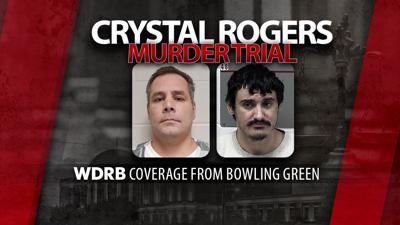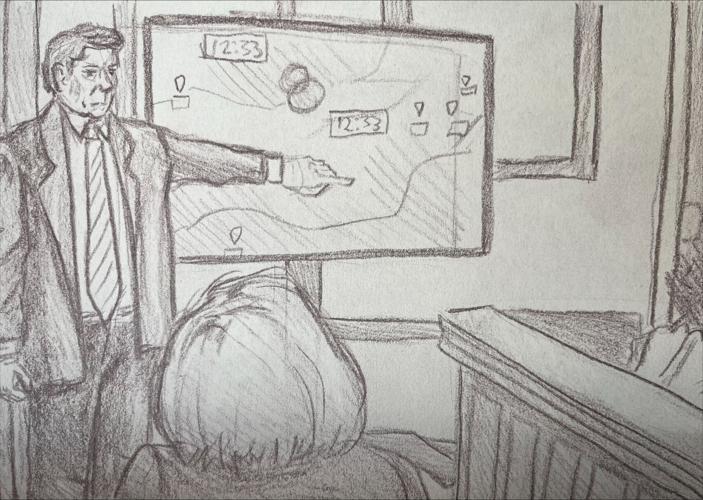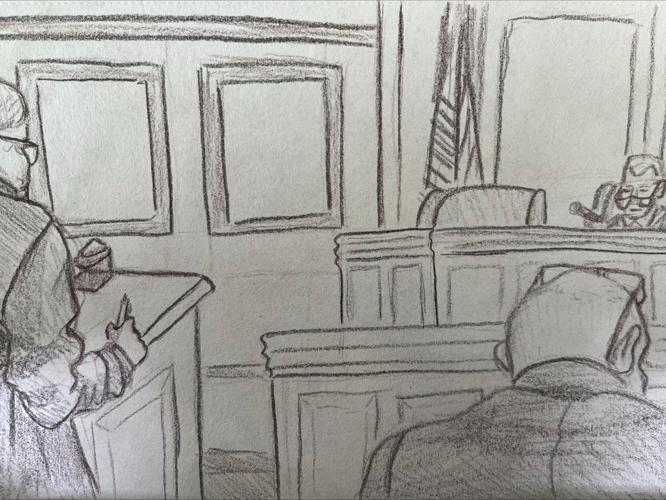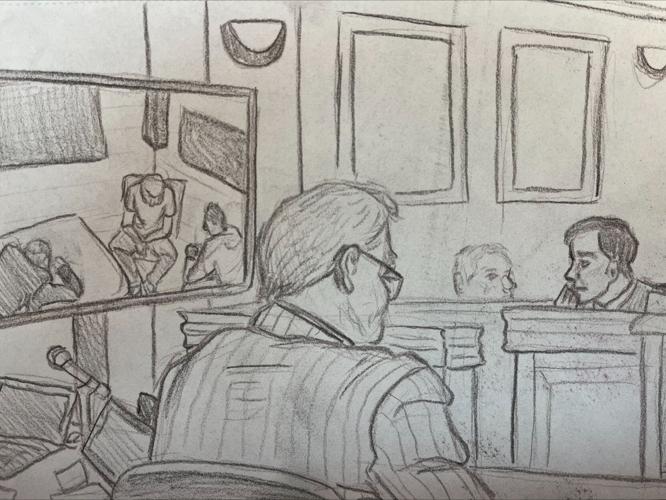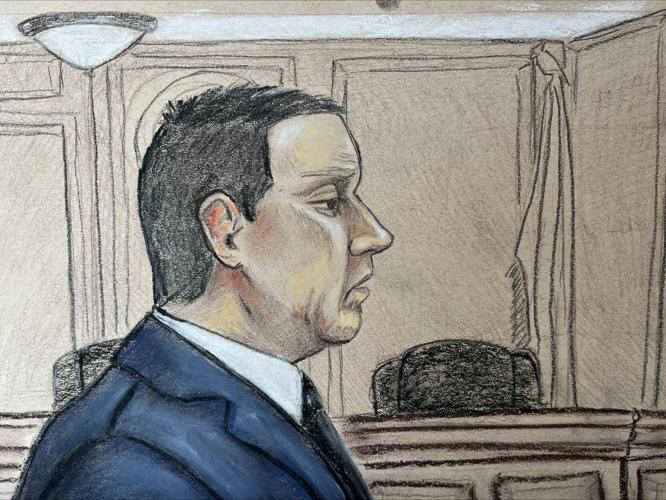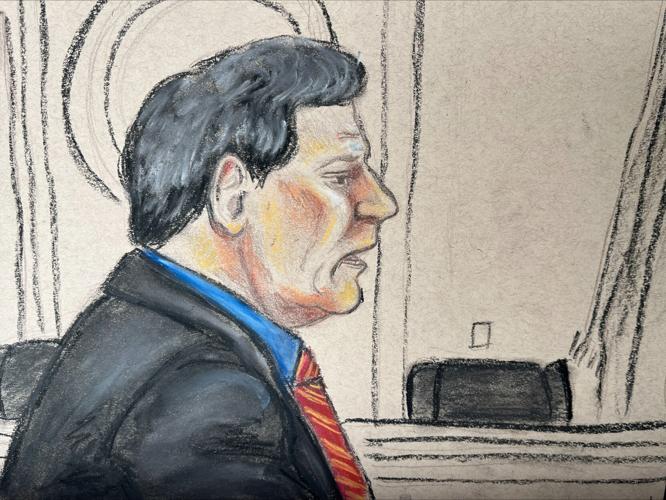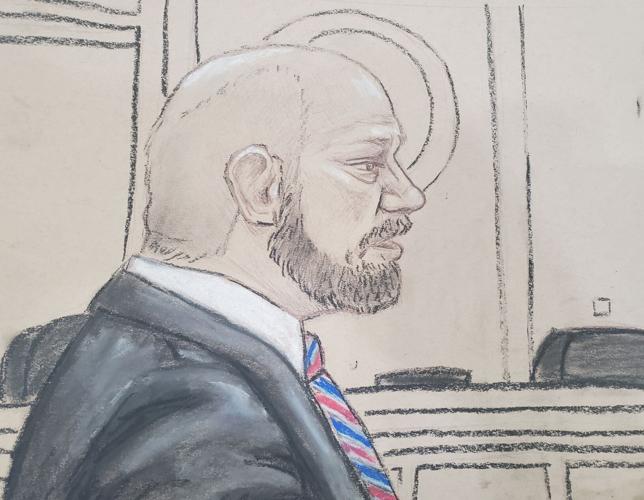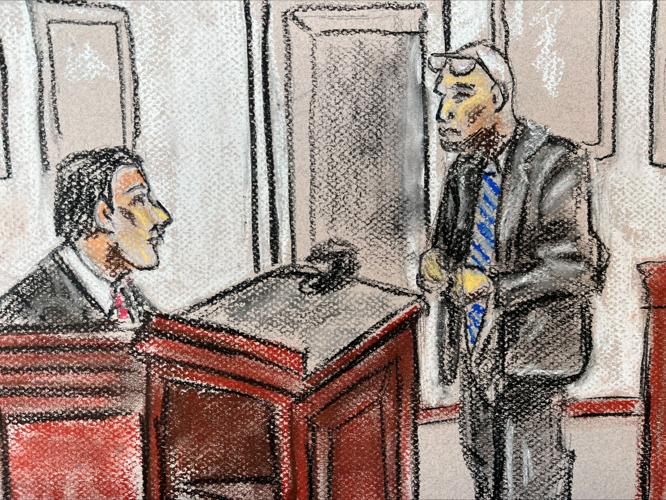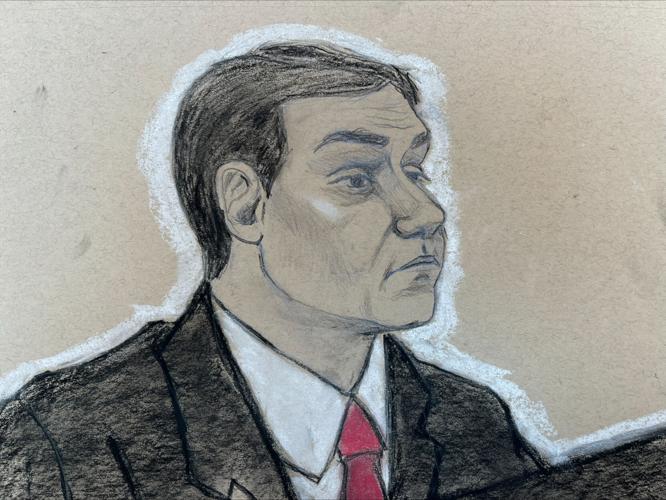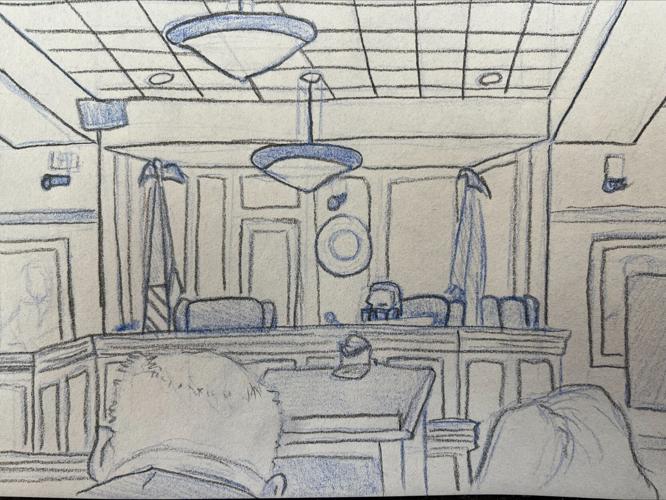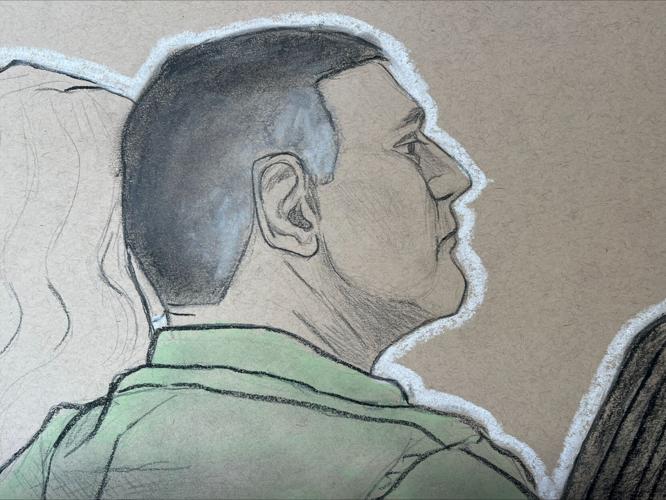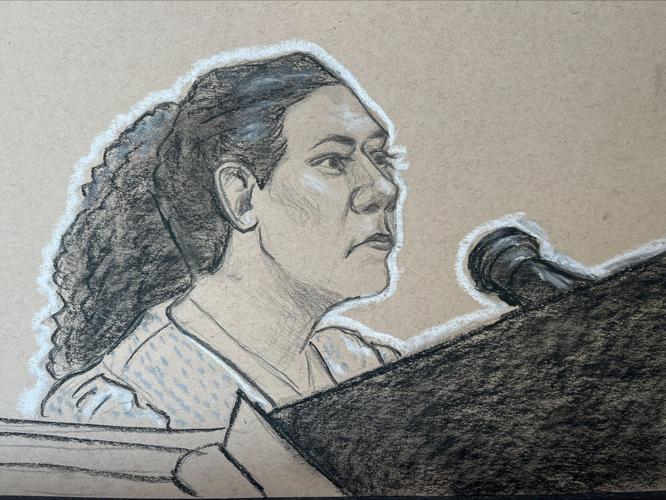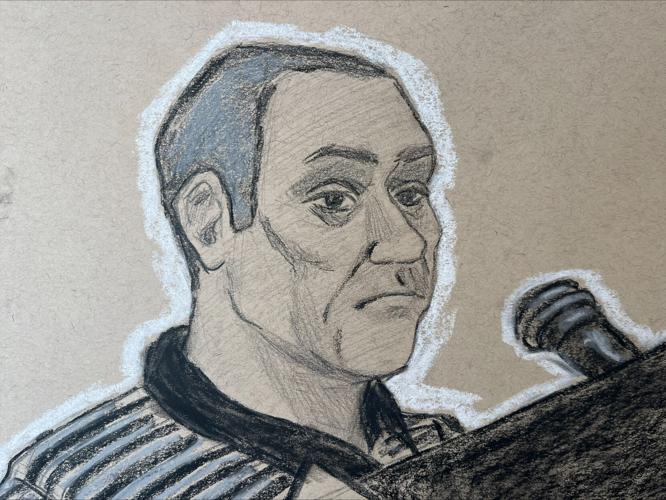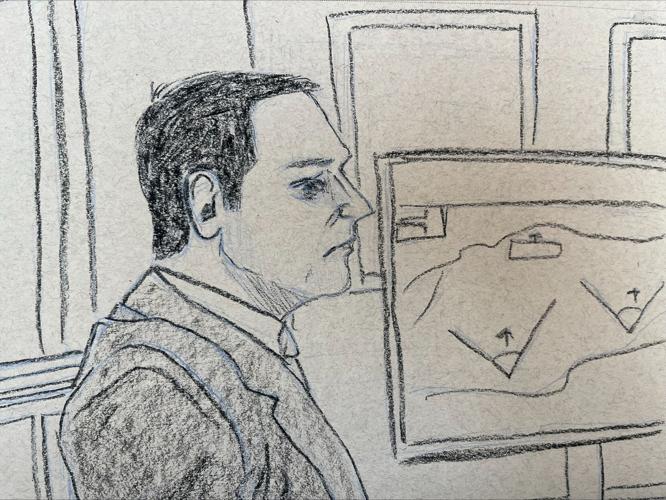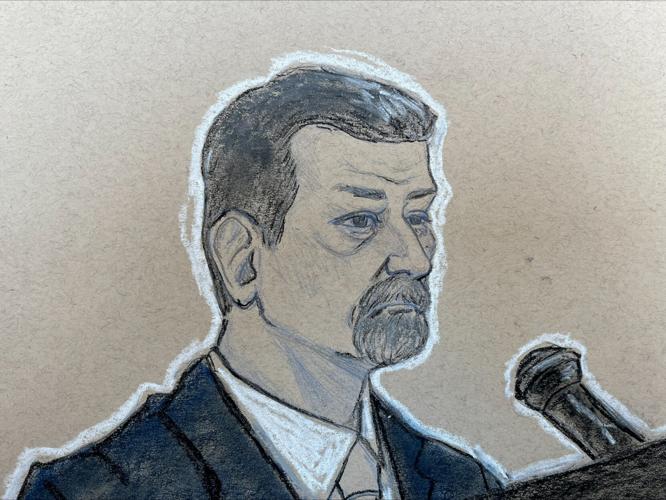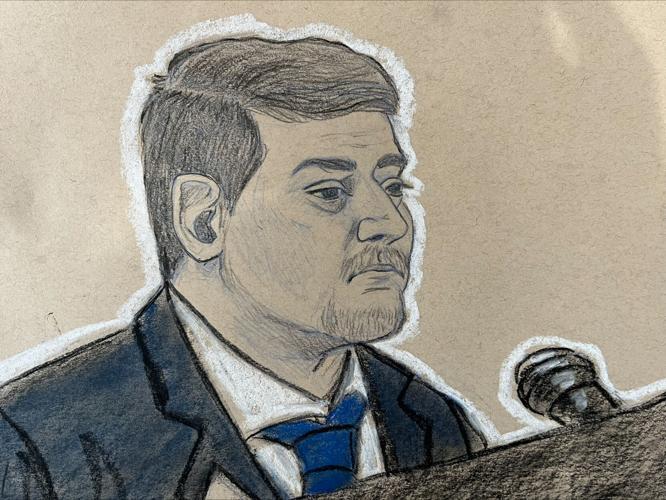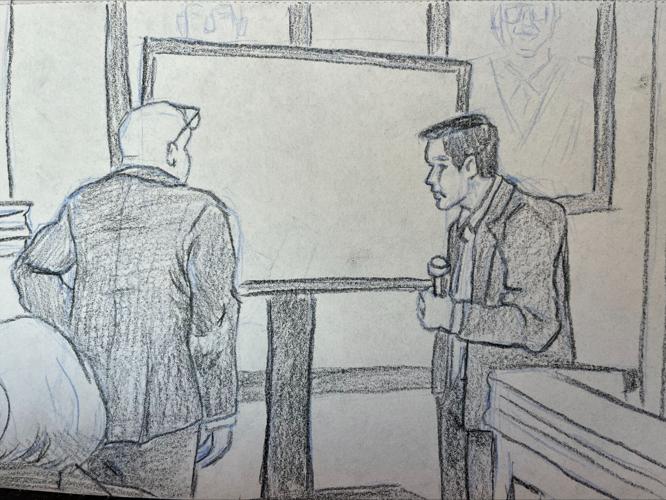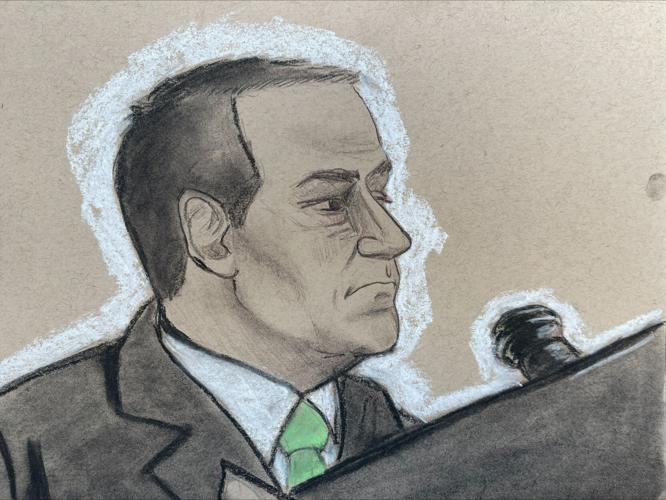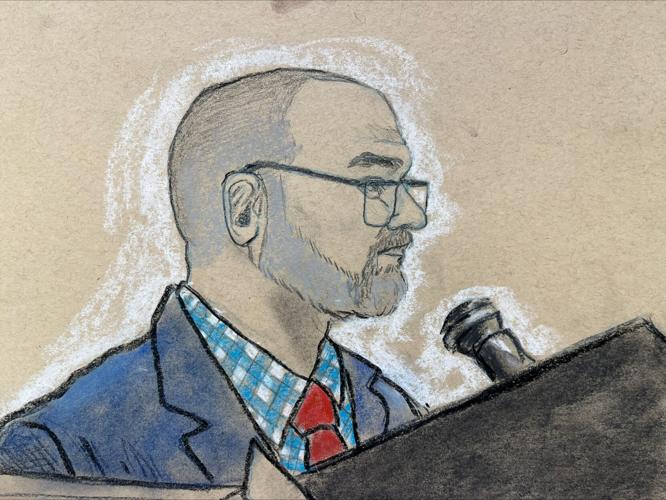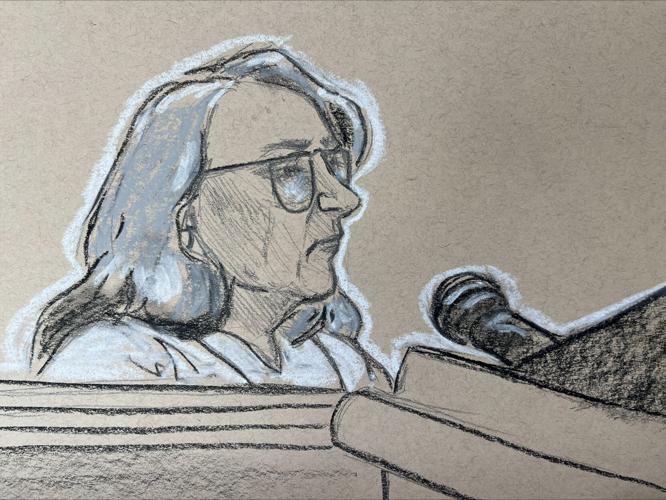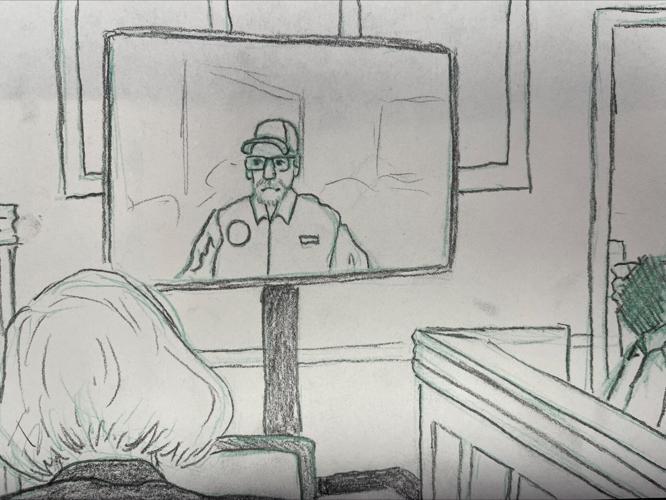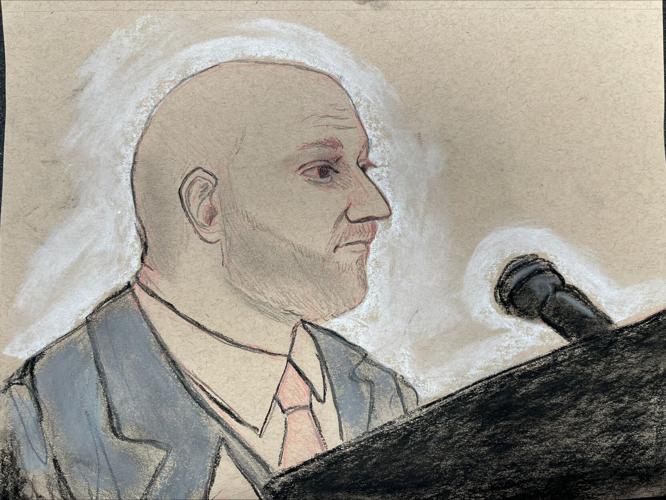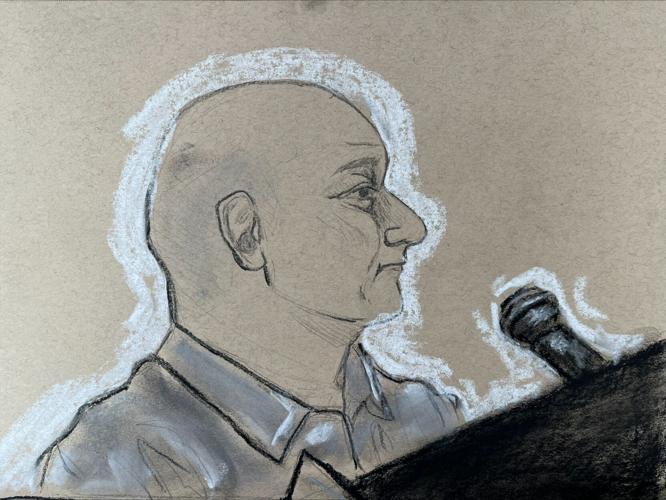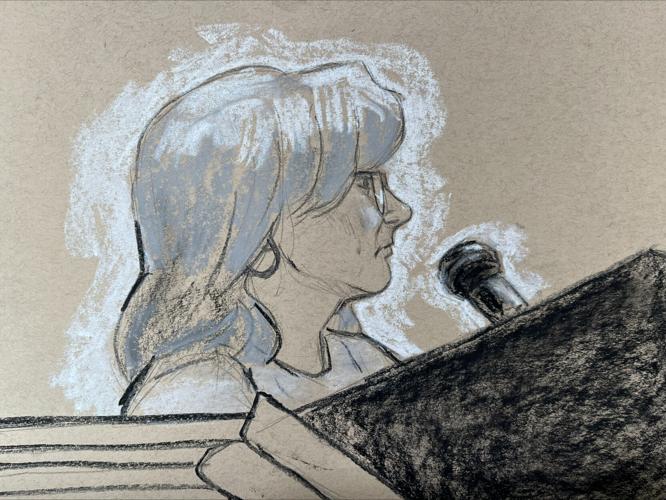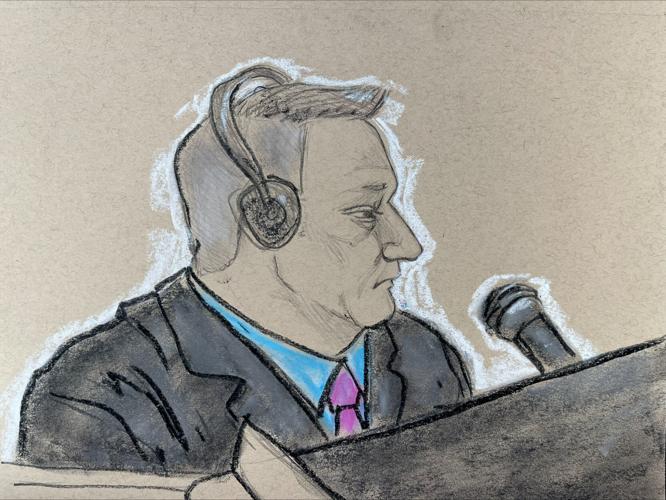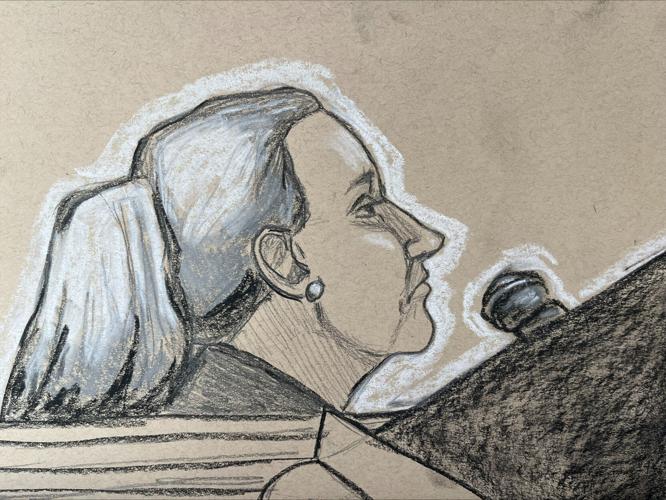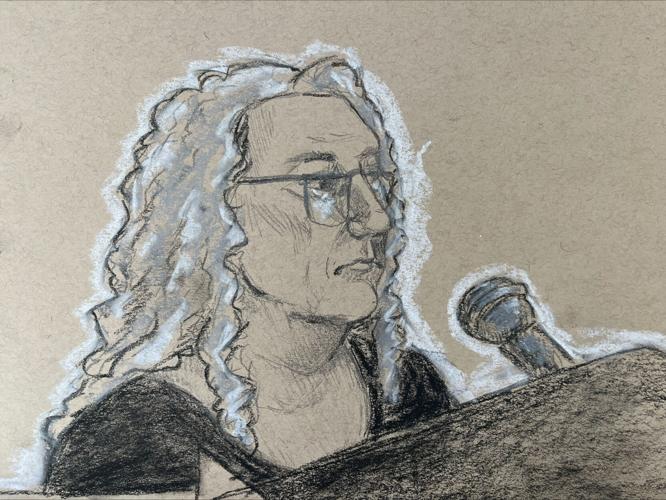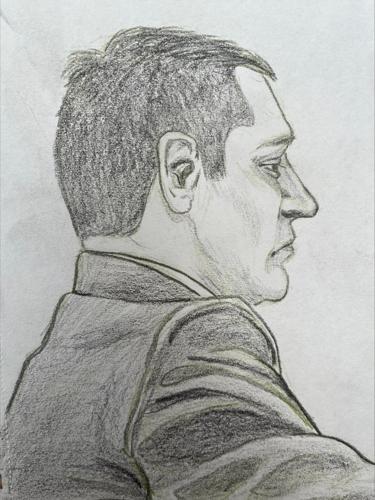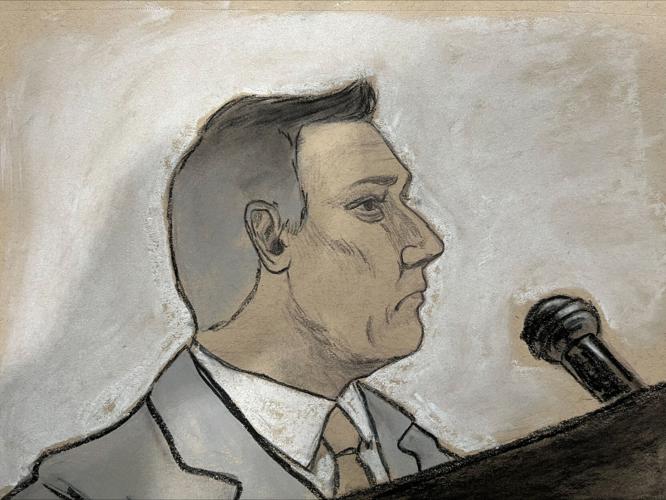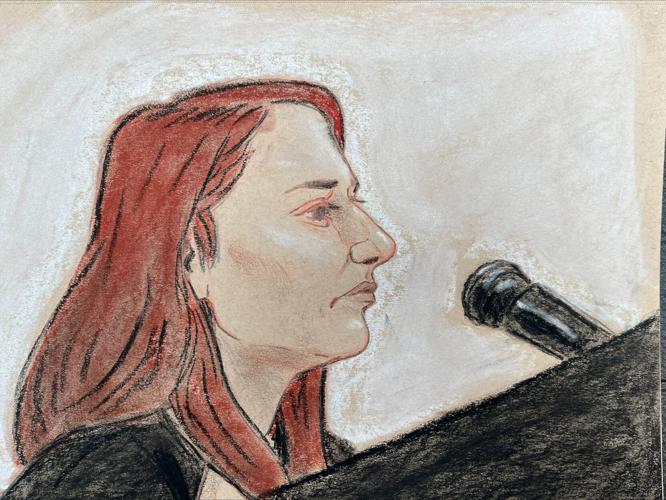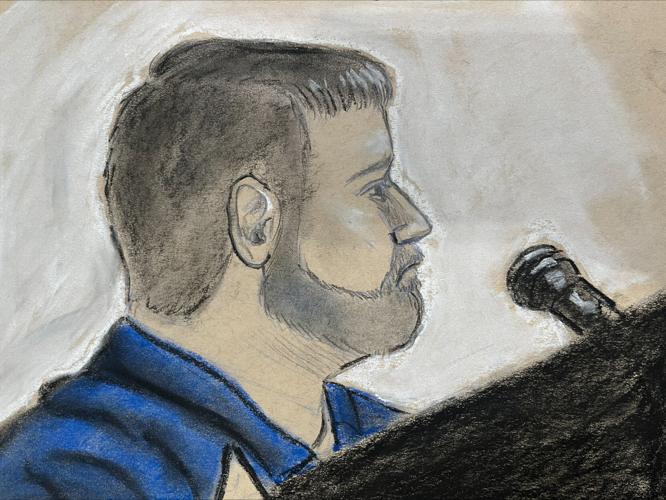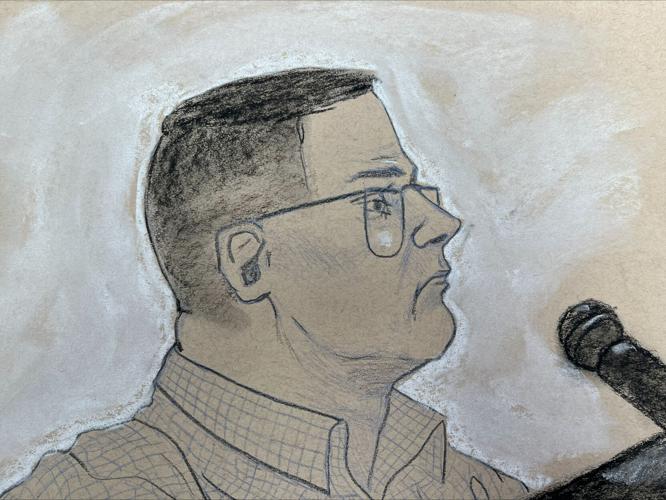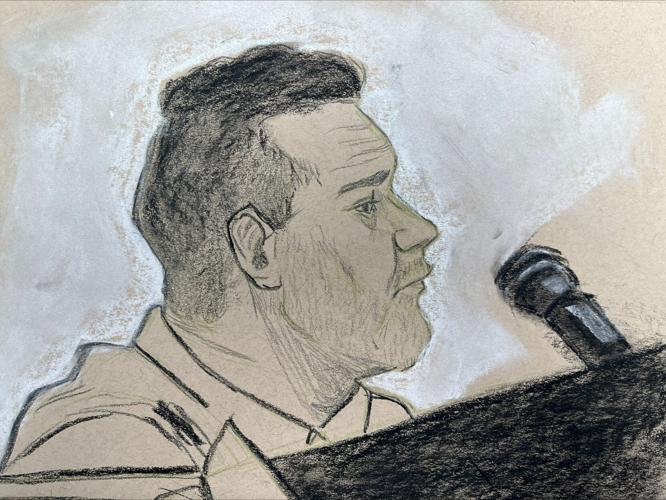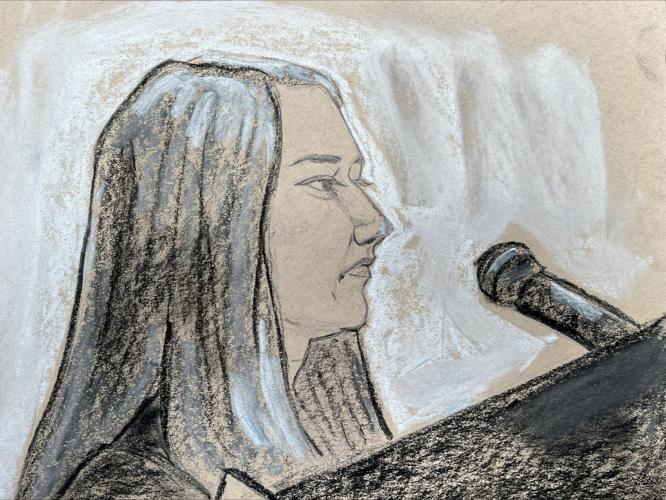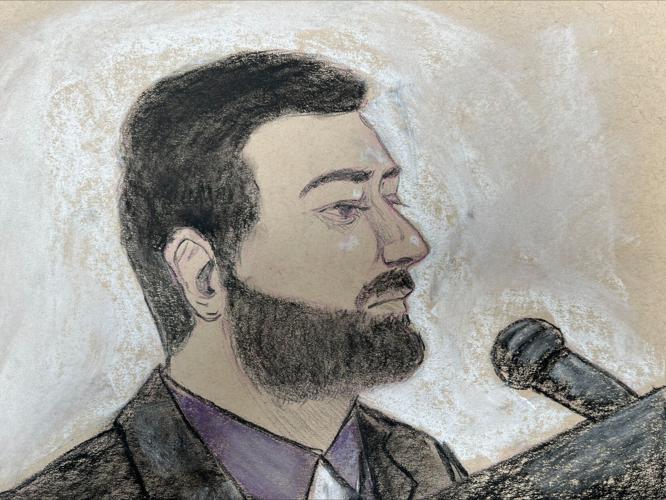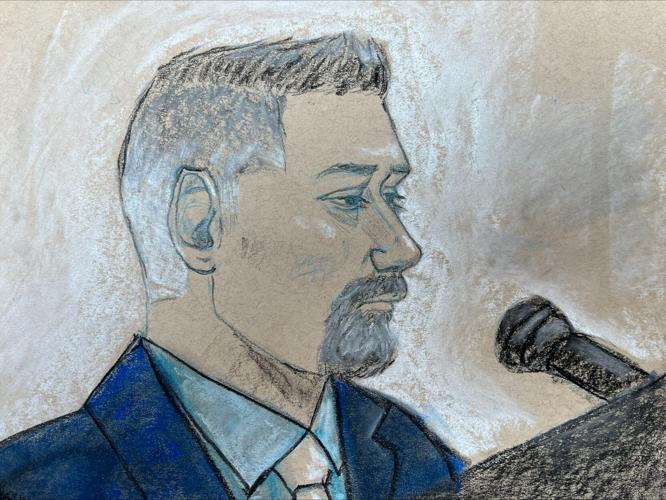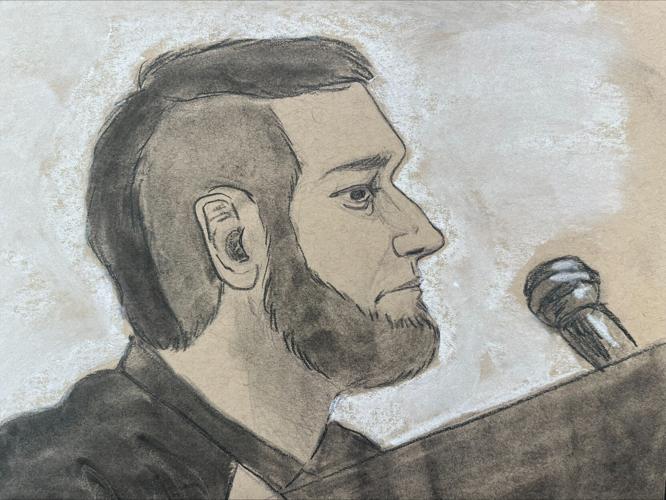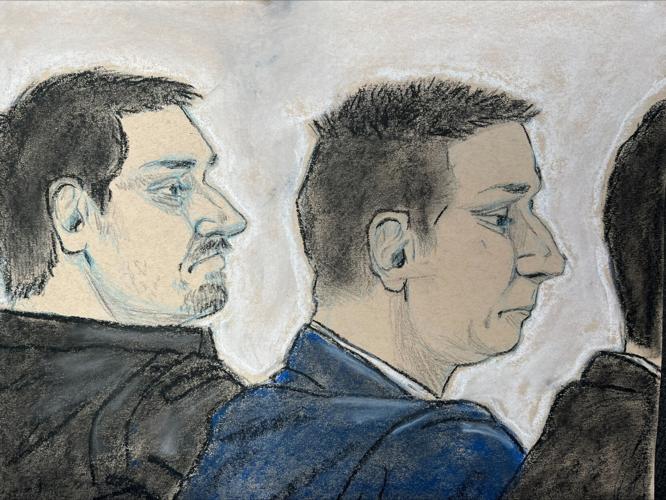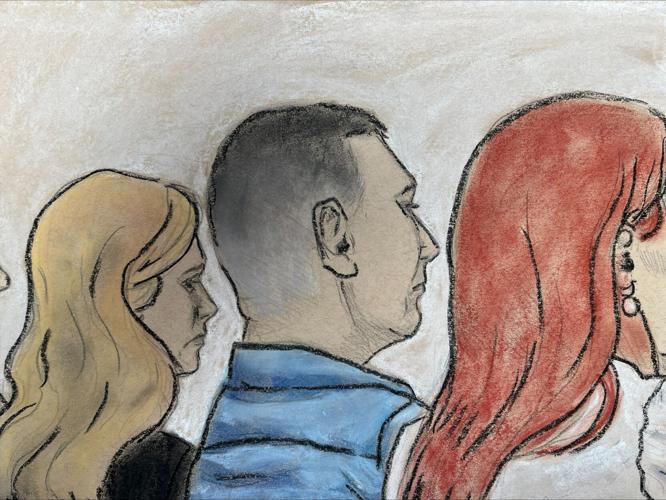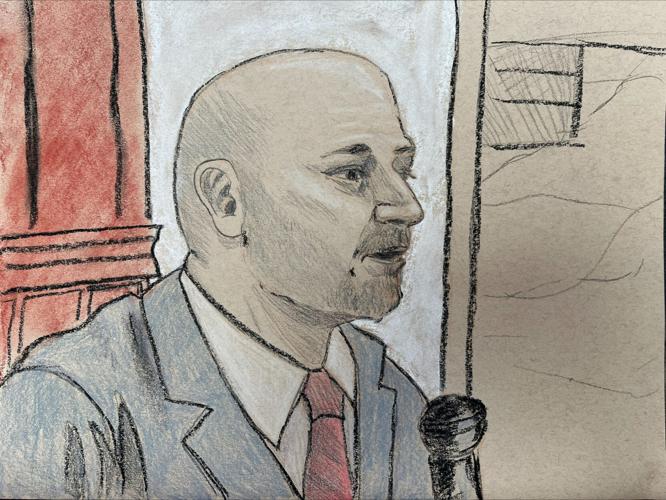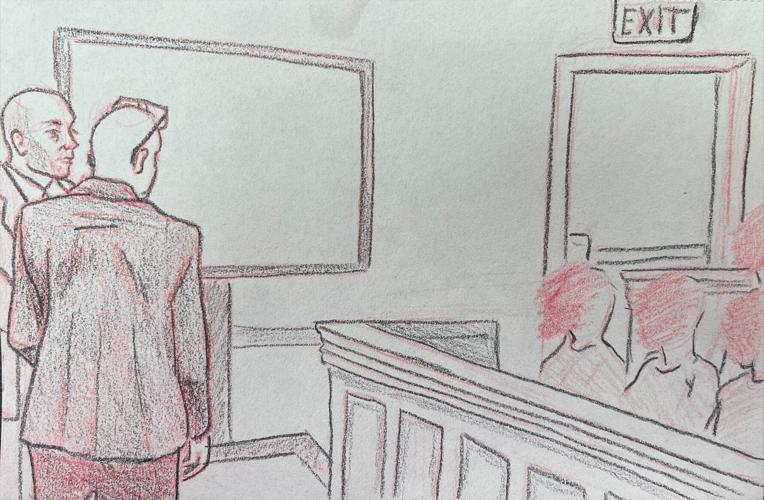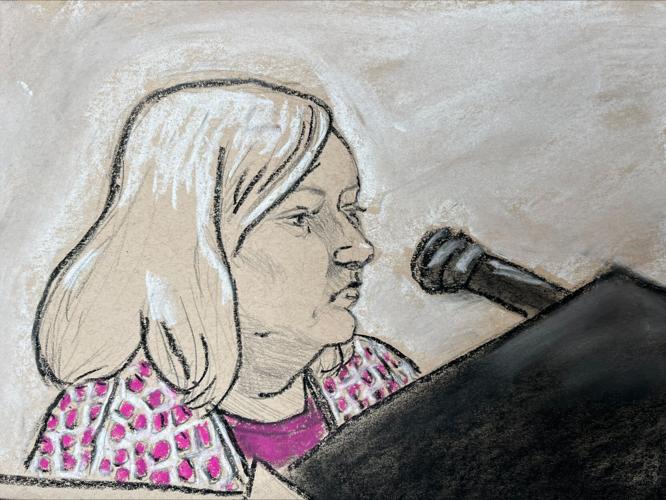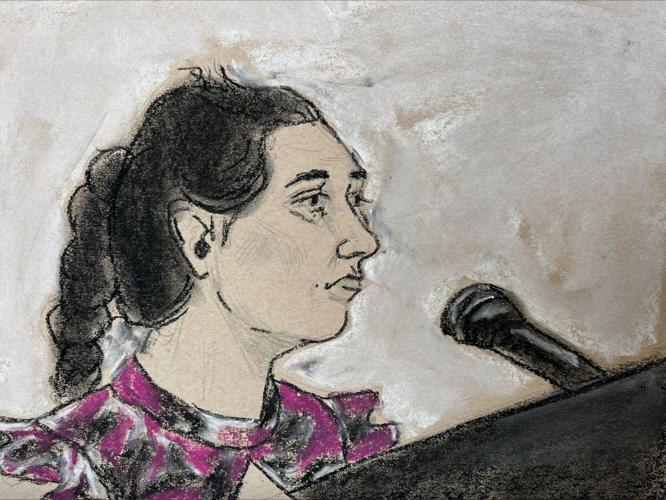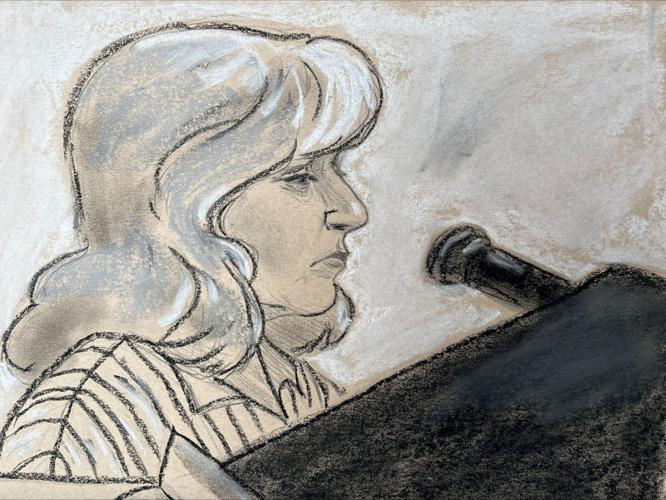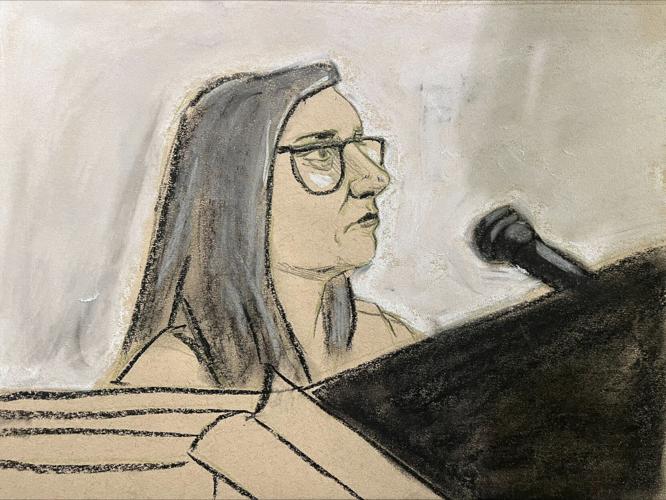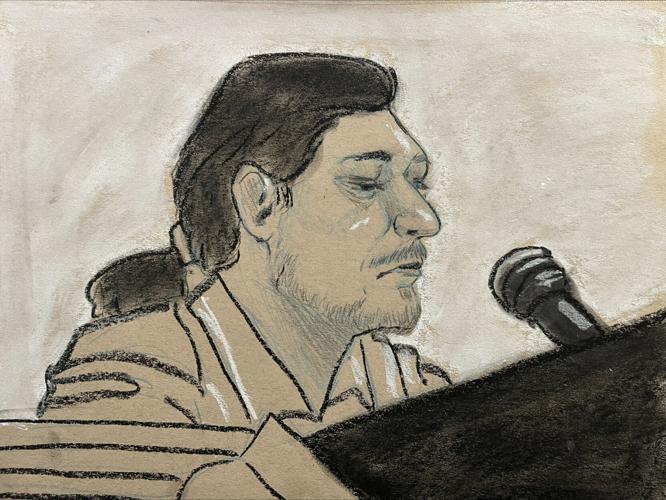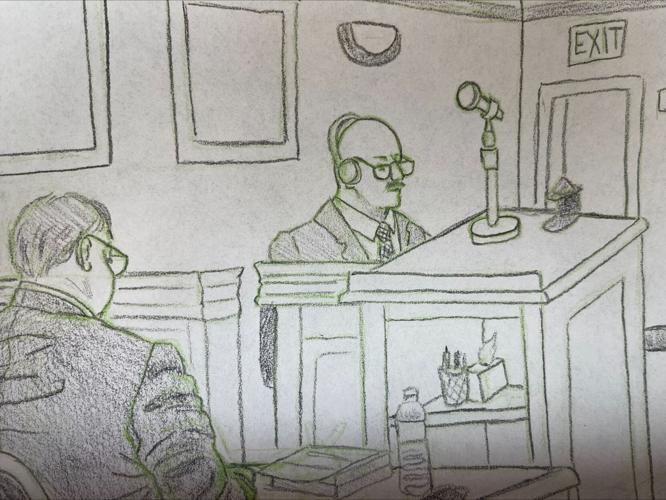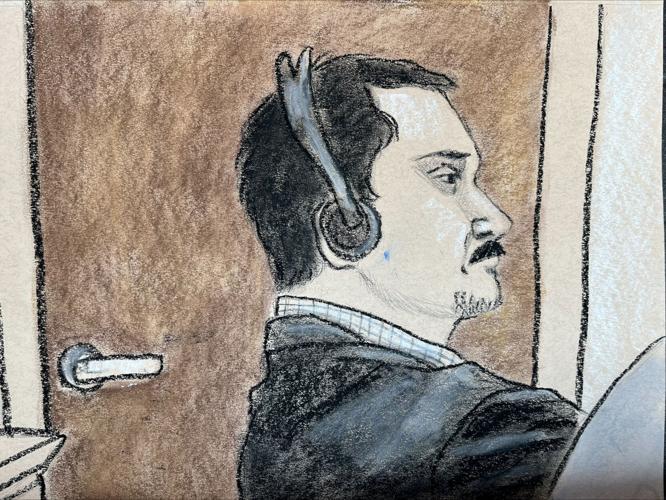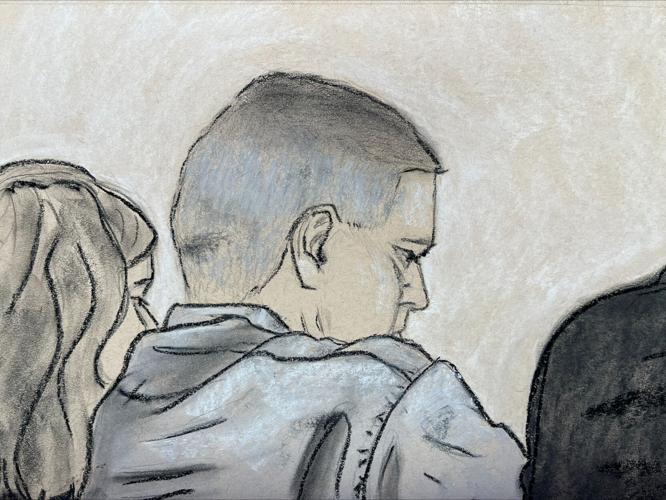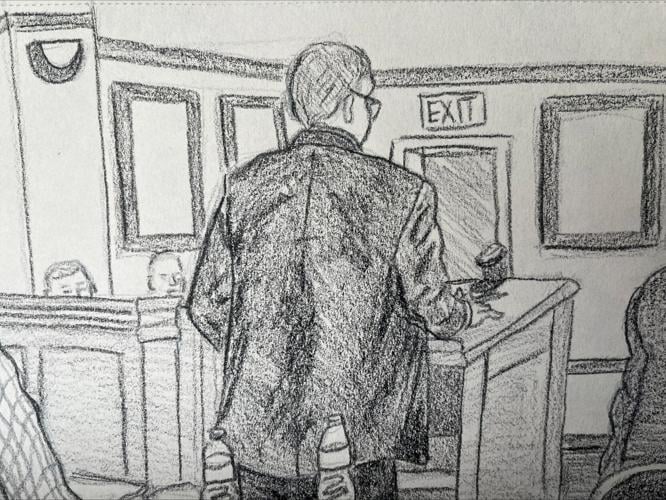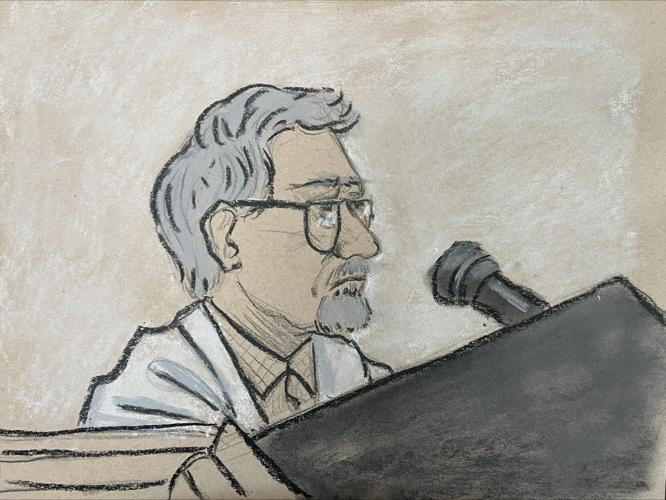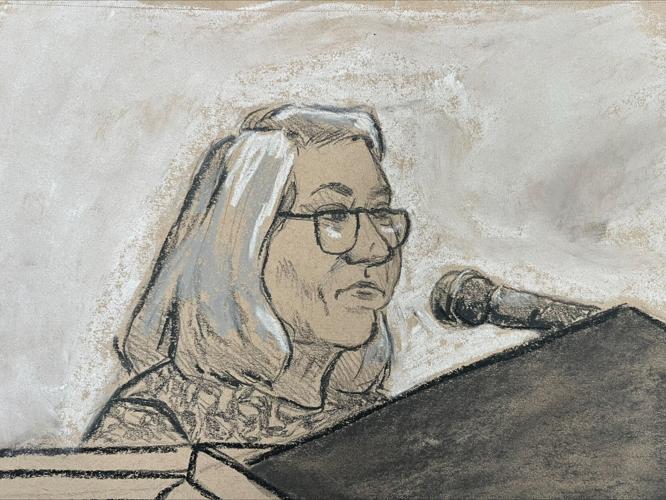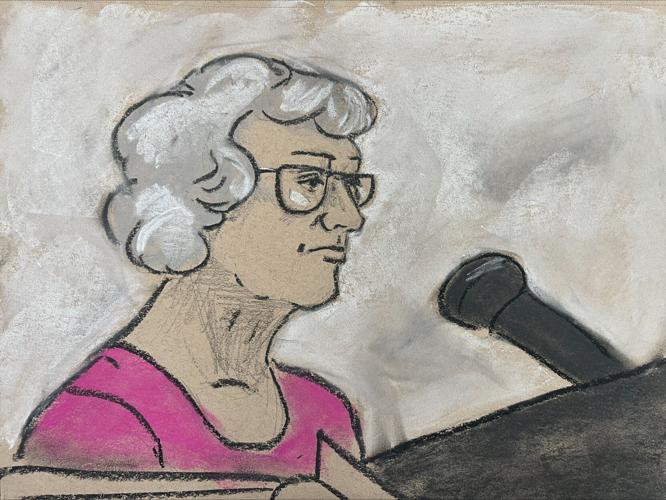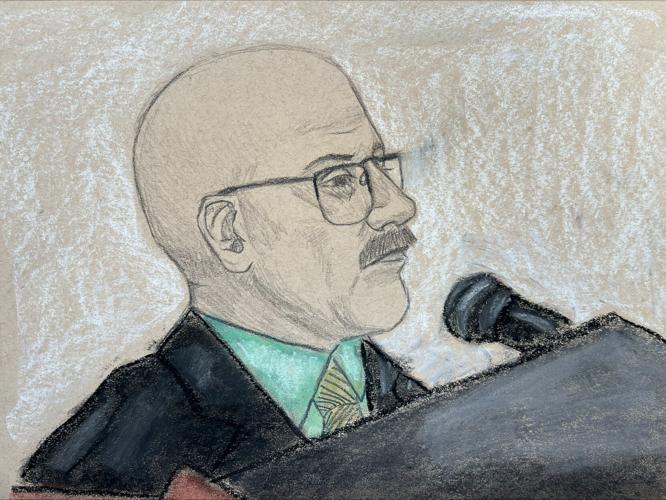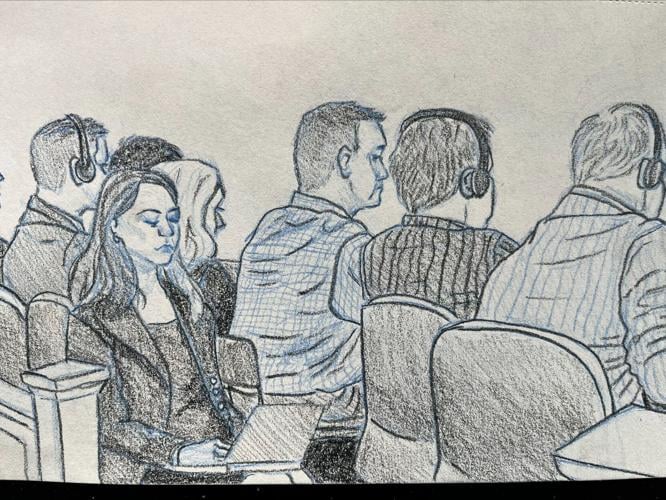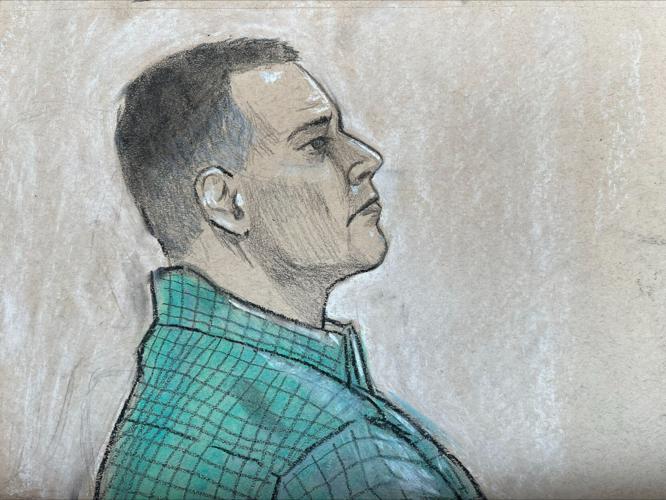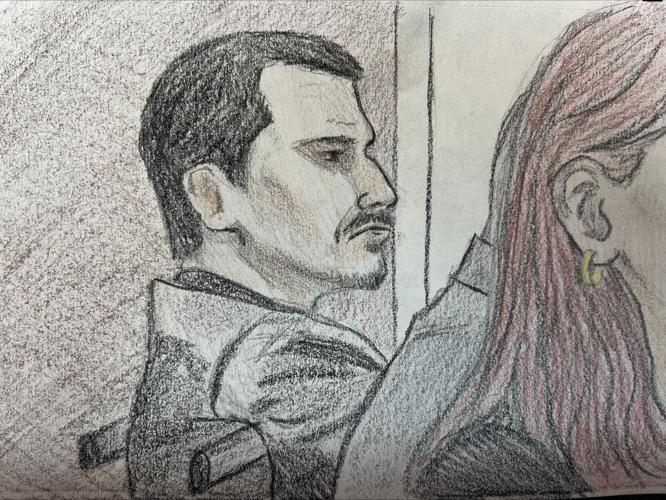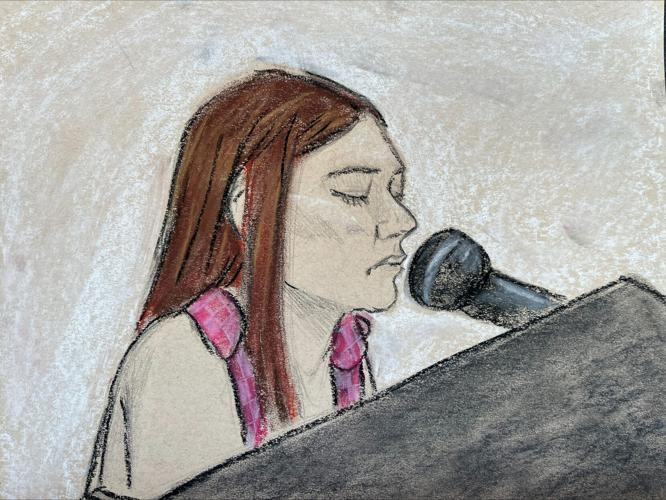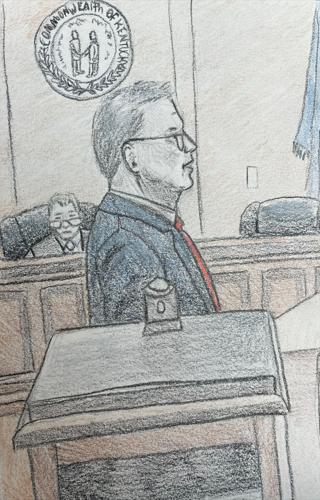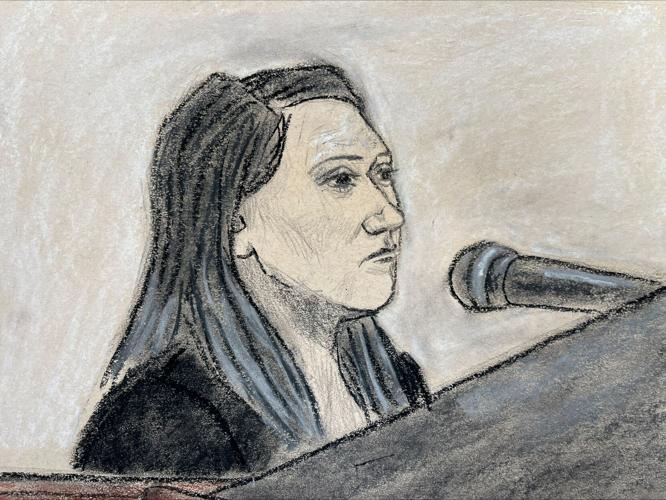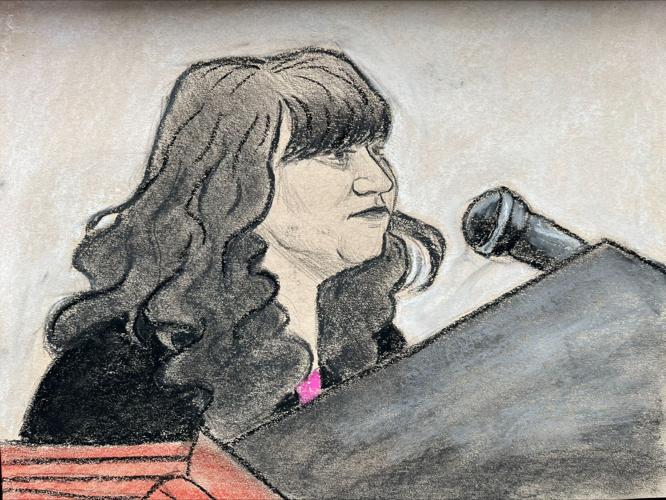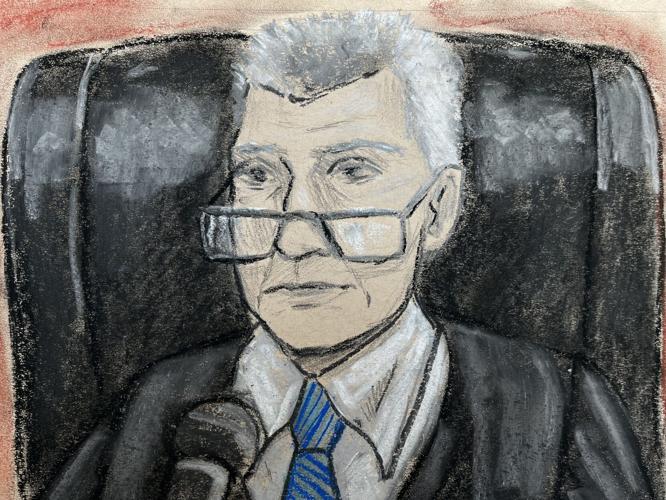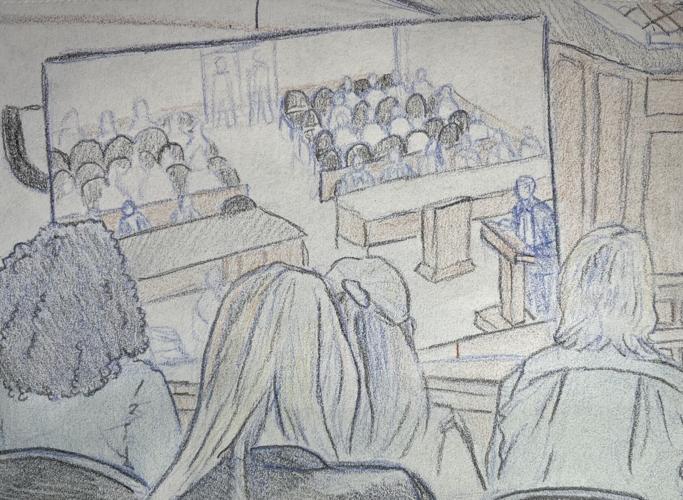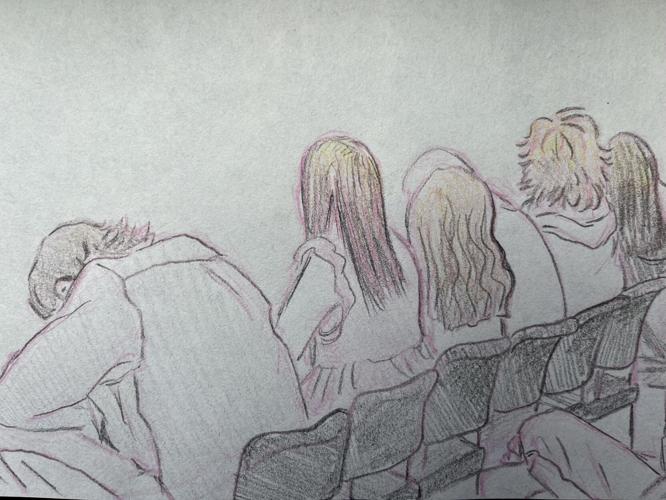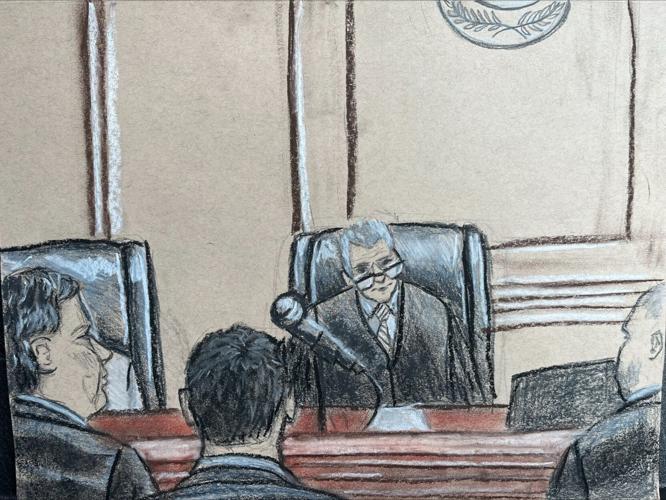BOWLING GREEN, Ky. (WDRB) -- The second trial in the murder of Bardstown mother of five Crystal Rogers began Tuesday. Her disappearance has been a mystery for nearly a decade since she went missing in July 2015.
Brooks Houck is charged with complicity to commit murder and tampering with physical evidence and faces up to 25 years to life in prison. Joseph Lawson is charged with conspiracy to commit murder and tampering with physical evidence, facing up to 25 years behind bars.
Below is a running blog of updates from the courtroom. Check back frequently as we report on testimony throughout the trial:
Neighbor of Brooks Houck, Crystal Rogers details what she saw the week Rogers disappeared
4:30 p.m. Friday, June 27 — Jason Riley and Lindsay Allen
Mary Mattingly, who lived across the street from Brooks Houck and Crystal Rogers, said she talked to Rogers every day and talked with her the day she disappeared about borrowing a baby swing.
On July 4, the day after Rogers disappeared, Mattingly said she woke up around 7 a.m. to see Rogers' car wasn't home. She said she found that unusual, as Rogers wasn't an early riser. Later that day, she testified she got a call from someone who said "your friend is missing."
The defense didn't challenge the phone data presented earlier Friday that placed Brooks Houck at his family farm during the day July 3, which was in contradiction to his previous statements to police.
The week Rogers disappeared, Mattingly said she saw Nick and Rosemary Houck — Brooks Houck's brother and mother — at the house. She watched Nick Houck pull in the driveway in his Bardstown Police cruiser and Rosemary Houck in her own car. They went inside but then came out to turn the cars around so the trunks faced the basement, Mattingly testified. She said Nick Houck then grabbed four bags and put them in his mom's car.
Mattingly also said she saw Rosemary Houck digging up flowers Rogers had recently planted.
The last witness of the week was William Gunther, who worked for Lowe's in 2015. On July 3, he got off work around 10 p.m. and took the Bluegrass Parkway home, as he regularly did. He testified Friday that he noticed Rogers' car on the right shoulder with the flashers on and no one in or around it.
Gunther said he saw the same car two days later with police surrounding it.
The jury was sent home for the weekend around 4 p.m. EDT. Court will resume at 9:30 a.m. Monday.
Digital forensic expert wasn't given access to Joseph Lawson's cellphone
3:15 p.m. Friday, June 27 — Jason Riley
Defense attorney Brian Butler spent much of Friday afternoon saying Joseph Lawson could have been on Boston Road, which runs parallel to Bluegrass Parkway, rather than up on the freeway, where Crystal Rogers' car was found after she disappeared. The prosecution has already used cellphone data to place Steve Lawson on the Bluegrass Parkway, where Rogers' car was found running the day after she disappeared.
Detective Tim O'Daniel, a digital forensic expert with the Louisville Metro Police Department, was never given access to Joseph Lawson's phone like he was given for Brooks Houck and Steve Lawson. He testified to that data earlier Friday. He was also given access to data from Nick Houck's phone, but from July 2 to July 4, it didn't register to any towers. It could have been off, or he could have been somewhere without cell signal, O'Daniel said.
Butler argued Joseph Lawson called his father, Steve, three times between 11:06 p.m. July 3 and 12:03 a.m. July 4, and not one of those calls showed up in the cellphone tower data.
The jury was also shown a picture in which you can see Rogers' car broke down right near a cellphone tower.
Digital forensic expert says data contradicts Brooks Houck's timeline the day Crystal Rogers disappeared
1 p.m. Friday, June 27 — Jason Riley
Detective Tim O'Daniel, a digital forensic expert with the Louisville Metro Police Department, testified Friday that Brooks Houck was at his family's farm on July 3, 2015, from 9:30 a.m. to 4 p.m., according to his analysis based on GPS, WiFi and cellular data stored in Google location records.
This contradicts Houck's timeline given to police after Rogers' disappeared, in which he laid out his activity July 3.
Houck claimed in that statement he went to several businesses that day. But in court Thursday and early Friday, the owners of some of those businesses said they didn't see Houck, and one even said the office was closed.
O'Daniel — a retired U.S. Marine who created LMPD's Digital Forensic Unit in 2021 — testified Houck went to a lumber store after 4 p.m. and was home from about 4:43 p.m. until 7:05 p.m. July 3, according to his analysis. He then went back to the farm, O'Daniel said, at 7:24 p.m. and stayed until 11:57 p.m. Houck has told police he and Rogers went to the farm at that time.
O'Daniel called the information in his testimony "very accurate."
He also testified Friday that Steve Lawson called Houck at 12:07 a.m. July 4, and the call came from near the area on the Bluegrass Parkway where Rogers' car was found later that day, phone records show. Lawson, who was convicted earlier this month of conspiracy to commit murder and tampering with physical evidence in the case, continued making phone calls until late in the morning, O'Daniel said.
So far, this has been the most damaging evidence presented against Houck, as it destroys his timeline of the day Rogers' disappeared.
O'Daniel will continue testifying at 2 p.m. EDT after a lunch break in court.
KSP may have coerced bombshell statement from Steve Lawson's ex-girlfriend, transcript shows
11:45 a.m. Friday, June 27 — Jason Riley, Hayden Ristevski and Lindsay Allen
Defense attorney Brian Butler set out to badly damage the credibility of Heather Snellen, Steve Lawson's ex-girlfriend who testified earlier Friday morning she heard the Lawsons talk about moving a body on the Houck farm with a skid steer.
Snellen testified under cross-examination she told KSP investigators the story about her car, but they continued asking her for more information, to which she replied she didn't know anything else. Butler said KSP investigators screamed at her to remember more.
Butler said Snellen was being investigated by Child Protective Services at the time, and, in a transcript of her interview with KSP provided in court Friday, one investigator threatened to charge her or have her kid taken away.
"Your life is pretty good," one investigator told her. "It can stay that way if you tell us everything you know."
Snellen finally left the interview after more than four hours of being grilled by KSP, and, when she got up to leave, a trooper got in her way and said "I don't want to have to take your little boy from you," according to the transcript. Below are other quotes from the transcript investigators told Snellen as they interviewed her for those four hours.
- "Your life might be ruined if you don't remember more."
- "When you come off with it, then you get to go home with your son."
- "We have a witness that saw you with Steve Lawson on July 3."
- "You remember that little boy when you're talking to us."
In a written statement she gave to KSP about a month later, Snellen wrote "I hope it's clear in my statement I don't know anything."
She said she felt she was "pressured" into providing KSP investigators the information they wanted.
"I've been pushed in a corner," Snellen wrote. "I don't like that."
Ex-girlfriend says she heard Lawsons talk about moving a body on the Houck farm with a skid steer
10:30 a.m. Friday, June 27 — Jason Riley, Hayden Ristevski and Lindsay Allen
A former girlfriend of Steve Lawson, Heather Snellen, testified Friday that she was at Lawson's home in 2017 when she overheard Lawson and his son, Joseph, talking about "moving a body at the Houck farm."
Snellen acknowledged she was on drugs at the time, which were supplied to her by Joseph Lawson, who is a co-defendant in the Crystal Rogers murder case. Under questioning from prosecutor Shane Young, Snellen also admitted she didn't tell police about what she heard, despite being interviewed by the FBI in 2021, because she "didn't want to be involved."
In 2023, she was interviewed multiple times by Kentucky State Police investigators and, at first, didn't tell them about the 2017 conversation.
But she later changed her story in a separate interview and told KSP about what she heard. However, on Oct. 27, 2023, she provided a written statement to KSP saying she "felt she was being pressured into saying things" and didn't know what happened to Rogers other than what she'd seen on TV.
Asked by Young why she sent the statement to KSP, she said she wanted to "distance herself from the case" because she was scared.
"The truth is I overheard Steve Lawson and Joseph Lawson talking about moving body at the Houck farm with a skid steer," Snellen testified.
Snellen also testified about a car she took after breaking up with Steve Lawson in 2014, though she said they argued well into 2015 about who should get it. The car has been a through-line of the trial so far, with the defense using it to explain Steve Lawson's whereabouts July 4.
The prosecution used cellphone data to place Steve Lawson on the Bluegrass Parkway, where Rogers' car was found running the day after she disappeared. But the defense contends he was actually picking up another car that had been taken by his ex-wife and was on Boston Road, which runs parallel to the Bluegrass Parkway.
Snellen testified Friday she left work early July 3 — at 10 p.m. in the middle of a 7 a.m. to 7 p.m. shift — and, after being picked up by her ex-husband, saw her car on the way home, used a spare key fob she had and drove it to someone else's home on Boston Road.
The next day, July 4, she testified she went back to the car to clean it out and found needles, blankets, a tourniquet, a big bag of soiled wet clothes and a Louisville Slugger bat. Steve Lawson testified in his trial earlier this month that he removed a Louisville Slugger bat from Rogers' car after he left it on the Bluegrass Parkway with his son, Joseph.
The purpose of her testimony, in the prosecution's narrative, was to prove Steve Lawson couldn't have gone to retrieve that car on Boston Road, as the defense claims, because Snellen had the car July 3 and July 4.
The defense is expected to cross-examine Snellen later Friday morning.
A former girlfriend of Steve Lawson, Heather Snellen, testified Friday.
Man testifies Brooks Houck's mom asked him how to 'get rid of' Crystal Rogers
5:45 p.m. Thursday, June 26 — Jason Riley
Danny Singleton, a man who worked in construction with Brooks Houck, testified Thursday afternoon that he had a conversation with Houck's mother, Rosemary, before Rogers disappeared.
Singleton told jurors Rosemary Houck approached him on a job site one day and "wanted to find someone to help get rid of (Rogers)." Singleton said he responded if you have enough money, you can get it done in Nelson County. Prosecutor Jim Lesousky mentioned the same conversation in his opening statement Wednesday.
Singleton acknowledged he didn't mention that conversation with Rosemary Houck to anyone until after he was arrested and charged with perjury in December 2015.
"I kept it to myself," he testified Thursday.
Singleton was accused of lying to a Nelson County Grand Jury about where he was the night Rogers disappeared. He told the grand jury he was in Louisville drinking with a friend.
Before his arrest in 2016, an FBI agent asked Singleton whether Rosemary Houck had any involvement in Rogers' disappearance. Singleton said no but admitted he lied to the grand jury about where he was that night.
He admitted he was actually doing crack cocaine with someone else in his apartment and was scared he'd be charged for that.
On Dec. 16, 2015, Singleton was arrested and faced up to 20 years in prison. Singleton said investigators visited him in jail April 5, 2016, questioning whether Rosemary Houck asked him about hiring a hitman to make Rogers disappear. That was the first time he told the story about what Rosemary Houck allegedly asked him.
Singleton's bond at the time was set at $300,000 and he'd been in jail for months on the perjury charges. After that conversation in jail with investigators, Singleton agreed to plea deal in which charges were amended down to misdemeanors. He was then released from jail.
Under cross-examination, Singleton acknowledged he drank heavily and did drugs in 2015.
Defense attorney Steve Schroering noted a prosecutor asked Singleton, in front of a grand jury, if he was involved in Rogers' disappearance or in helping to move her car. At one point, Schroering said, the prosecutor asked Singleton what he was going to do to convince the grand jury he didn't kill Rogers.
"What can I do?" Singleton responded, according to a transcript used during his testimony in court Thursday.
In July 2023, Kentucky State Police came to Singleton's home and told him something big was getting ready to happen and he needed to be on the right side of the case, Schroering noted. Singleton said he was told to tell the truth, and "that's what I'm telling."
Questioned about the veracity of his story, Singleton insisted "it is the truth."
The jury was sent home for the day around 5:45 p.m. EDT.
Nelson County business owners take the stand, contradict Brooks Houck's story
4:45 p.m. Thursday, June 26 — Jason Riley
The prosecution continued Thursday afternoon to try to poke holes in the statement Brooks Houck gave to police detailing what he did July 3, 2015, the day Crystal Rogers disappeared.
For starters, Houck never mentioned in his statement on in any answers to police he went to the family farm during the day. But the prosecution showed surveillance video of his truck going to the farm that day before he and Rogers returned that night.
In addition, several business owners who Houck said he met with that day denied seeing him. In fact, the owner of one of those businesses told the jury on the stand Thursday the office was closed that day for the holiday.
Defense shows text message Brooks Houck sent to Crystal Rogers after she disappeared
3:15 p.m. Thursday, June 26 — Jason Riley, Hayden Ristevski and Lindsay Allen
After a break for lunch, defense attorney Steve Schroering presented evidence showing Brooks Houck repeatedly called and texted two family members of Crystal Rogers on July 4 and July 5, asking if they knew where she was. Both said they'd tried to contact Rogers and hadn't received a response.
Houck also called and texted Rogers' phone on those days after she went missing, Schroering said
"Everyone is worried sick," the text message read, according to evidence provided in court Thursday. "Please call me back."
But prosecutors pointed out Houck only called Rogers twice and texted once in the 36 hours after she disappeared.
On July 5, evidence showed this text message between Houck and Rogers' cousin, Sabrina:
Houck: "What's up it's Brooks ... Is Crystal with you"
Sabrina: "No ... Haven't seen her"
Another text thread shown in court Thursday is from April 26, about six weeks before Rogers disappeared:
Rogers: "I cannot deal with the way you treat me anymore. I'm tired of always being on the back burner ..."
Houck: "Please come back home ... Running from your problems won't fix them."
Under cross-examination, Jon Snow, who was the lead detective on the case for the Nelson County Sheriff's Department, acknowledged there was a fingerprint found on Rogers' cellphone that didn't match anyone in the Houck or Lawson family. A palm print on Rogers' car also didn't match anyone in either family. Snow told Schroering on the stand it didn't appear the car had been wiped clean after being left on the Bluegrass Parkway.
The defense has offered an explanation as to why cellphones belonging to Steve Lawson and his son, Joseph, were pinged near where Rogers' was found after she disappeared. They've said Steve Lawson was retrieving a car that had been taken by his ex-wife and was on Boston Road, which runs parallel to the Bluegrass Parkway. Schroering said a Nelson County sheriff's deputy viewed surveillance video from a food mart on Boston Road from July 3-4, but prosecutors objected, and there was no more discussion of the video after a bench conference.
For the first time in the trial, Kevin Coleman, an attorney for Joseph Lawson, questioned a witness. Coleman asked Snow if the only information presented about Joseph Lawson so far is that his DNA wasn't found in Rogers' car. Snow indicated that was correct.
Snow finished testifying around 3 p.m. after several hours on the stand over two days.
Defense claims leaked interview with Brooks Houck could have tainted future witnesses
1:15 p.m. Thursday, June 26 — Jason Riley and Hayden Ristevski
The defense began its cross-examination of Jon Snow, who was the lead detective on the case for the Nelson County Sheriff's Department, by noting investigators have spent thousands of hours on this case, interviewed hundreds of people and conducted numerous searches of Houck family property. Snow said they found no physical evidence of a crime scene, body or method of death.
In addition, Snow acknowledged Houck fully cooperated with investigators, providing multiple interviews, his fingerprints, his cellphone and consented to searches of his home and vehicle. Snow admitted he's done more searches in this case than any other in his career.
Defense attorney Steve Schroering provided more context for the July 3, 2015, midnight phone call from Steve Lawson to Brooks Houck. The two have claimed the call was about a rental property, while prosecutors claim Lawson called to tell Houck that Rogers' vehicle had been successfully moved.
However, Schroering said in cross-examination that Lawson's step-daughter had been evicted from one of Houck's properties, showing text messages from August 2015 in which the woman's husband asked Houck about looking at a new house.
As for Nick Houck, who Snow earlier testified told Brooks Houck, basically, to stop talking to police, Schroering said Brooks Houck told him "ask what you have to ask" after talking to his brother.
Also, Schroering asked Snow on the stand about the video of the July 8 interview being released to the public in October 2015. Snow said the interview was sent to the Bardstown Police Department, but he wasn't sure how it got out.
As a result, Schroering indicated any possible witness from that point on would be able to see Brooks Houck's interview, which he said received more than 150,000 views. He also talked about Snow being interviewed for a six-part series on the Oxygen Network in 2018. Schroering's point to the jurors was to show witness testimony could have been tainted by the public interviews.
Schroering made a point to note Houck affirmed Rogers wasn't suicidal and didn't do drugs. In the interview with Snow played for the jury, he also didn't have any additional theories for what might have happened to her.
The jury broke for lunch until 2:15 p.m. EDT. Snow will remain on the stand after lunch.
Observations from the courtroom on Day 3 of the second Crystal Rogers murder trial in Bowling Green.
Brooks Houck's brother refused to speak with investigators, lead detective testifies
12 p.m. Thursday, June 26 — Jason Riley
Jon Snow, who was the lead detective on the case for the Nelson County Sheriff's Department, testified that after his July 8, 2015, interview with Brooks Houck, surveillance video showed Brooks Houck's truck and the police cruiser of his brother, Nick Houck, going to the Houck family farm, where Brooks Houck and Crystal Rogers went the night she disappeared.
Nick Houck, who was a Bardstown Police Department officer at the time, has been referenced several times already during the trial and was called an "unindicted co-conspirator" by the prosecution. Nick Houck also called Brooks Houck during the July 8 interview with Snow and warned him about continuing to talk to police.
Snow said he requested Nick Houck come in for an interview with investigators July 9, but he declined.
The chief of the Bardstown Police Department at the time of Rogers' disappearance took Nick Houck's cruiser and had it tested at the Kentucky State Police lab, Snow testified Thursday. Snow said nothing of evidentiary value was found.
During the July 8 interview with Brooks Houck, Snow said some of the gaps in the story are "really important" and asked him why he wasn't worried about Rogers when he woke up July 4 morning to find her gone. Houck replied she sometimes would go out with friends to "fantasy" parties. Snow testified Thursday that he didn't find any indication she'd been to a "fantasy" party before.
Brooks Houck was also asked in the interview about a call he received from Steve Lawson shortly after midnight the night Rogers disappeared. Lawson was convicted earlier this month of conspiracy to commit murder and tampering with physical evidence in the case.
Brooks Houck said he didn't remember the call so he called Steve Lawson during the police interview to ask him what that call was about.
Lawson, according to a video played for jurors Thursday, said he called Brooks Houck about a rental house and was told he'd have to talk to Rogers about it. Snow asked Brooks Houck why he didn't just ask Rogers about it then if they were in the truck together coming back from the farm.
"She didn't want to deal with stuff that late," Brooks Houck replied, according to the video.
The jury also heard a July 9, 2015, interview between TV personality Nancy Grace and Brooks Houck, who repeated the story about going to the family farm the night of July 3. He also said when they went home about midnight, she played games on her phone and he went to sleep.
The prosecution finished questioning Snow, and the defense will begin its cross-examination Thursday afternoon.
Brooks Houck recorded police interview after Crystal Rogers disappeared, lead detective testifies
10:45 a.m. Thursday, June 26 — Jason Riley, Hayden Ristevski and Lindsay Allen
Jon Snow, who was the lead detective on the case for the Nelson County Sheriff's Department, resumed testifying Thursday morning.
Jurors heard and/or saw parts of two interviews investigators conducted with Brooks Houck in the days after Crystal Rogers disappeared in July 2015. Joseph Lawson and the jury listened on headphones, but Houck didn't.
In one interview with multiple officers July 7, Houck was asked to name the worst the thing that ever happened to him. Snow testified Thursday that Houck "didn't provide an answer." Snow also testified Houck clearly told them in that interview Rogers was playing on her phone when he went to bed after midnight she went missing. On Wednesday, prosecutors said Rogers' phone was shut off at 9:27 p.m. July 3.
In the other interview shown to jurors Thursday morning, which took place July 8, Houck showed up to the Nelson County Sheriff's Office with an audio recorder in his pocket, Snow testified.
Snow told Houck he was a "person of interest" in the case and questioned what Houck and Rogers were doing on the Houck farm on a rainy night from 7:30 p.m. to almost midnight July 3.
Houck said they had a fire going and left when it burned out.
Asked to write out a statement about what he did that day, Houck wrote for about an hour and 20 minutes. At times, he read the statement out loud to himself, which is notable given he had an audio recorder in his pocket. Prosecutor Shane Young asked Snow in court Thursday if it was typical for a suspect to read their written statement aloud.
"No," Snow responded.
Snow also asked Houck in the interview if he and Rogers had a rough relationship.
"We had fought like any other couple, Houck replied. "At times, it was a stressful relationship.
"... We love each other very much."
Rogers' sister sat in the courtroom listening to Houck's interview with her head in her hands, clenching her hair anxiously.
The jury took a short break around 10:45 a.m. EDT, and Snow will continue testifying afterward.
Jon Snow, who was the lead detective on the case for the Nelson County Sheriff's Department, resumed testifying Thursday morning.
Snow says Brooks Houck story was consistent at first
5 p.m. Wednesday, June 25 — Jason Riley
The jury was shown surveillance video Wednesday afternoon from business and houses showing Houck driving to the farm around 7 p.m. July 3 — the night Rogers went missing — and leaving just before midnight.
Prosecutors and defense attorneys alike have previously used these surveillance snapshots to offer a timeline of Houck's actions that night.
Prosecutor Shane Young asked Jon Snow, lead detective for the case with the Nelson County Sheriff's Office, if Houck's story has been "pretty consistent" so far, and Snow said it has.
Judge Charles Simms III then sent the jury home for the day, because the next interview Snow did with Houck on July 8, 2015, lasts for about 90 minutes. Snow will resume his lengthy testimony with that video at 9:30 a.m. Thursday.
Lead detective found it 'unusual' Brooks Houck didn't report Crystal Rogers missing
4:30 p.m. Wednesday, June 25 — Jason Riley
Jon Snow, lead detective for the case with the Nelson County Sheriff's Office, began a lengthy testimony Wednesday afternoon detailing his investigation.
He told the jury Houck and Rogers went to the family farm July 3, 2015, from about 7:30-11:30 p.m. and then went home. Houck told Snow in a July 5, 2015, interview — which was played for the jurors Wednesday — Rogers stayed up late with their young son after they got home from the farm and she usually played games on her phone before bed.
Snow said Houck told him when he woke up July 4, his son was in bed with him, and Rogers was gone. Snow testified a neighbor told police they noticed Rogers' car was gone at 6:30 a.m. July 4.
Houck never reported Rogers missing, Snow said.
Asked by prosecutor Shane Young if he found anything unusual about Houck's initial July 5 interview, Snow said "it was a little unusual he didn't report her missing."
Police checked Rogers' car for DNA and hair samples and submitted what they found to the Kentucky State Police lab. Snow said no evidence came back proving who'd been driving the car.
As of 4:40 p.m. EDT, the jury is on a brief break. When court resumes, Snow will continue testifying, including about an interview he conducted with Houck on July 8.
Brooks Houck planned 'surprise' date night for Crystal Rogers the night she disappeared, her cousin testifies
3 p.m. Wednesday, June 25 — Lindsay Allen
Rogers' second-cousin, Amanda Greenwell, took the stand after lunch Wednesday. She told the court she saw Rogers at Walmart on July 3, 2015, the day she disappeared. Rogers said she was excited for a kid-free surprise date that night with Houck, Greenwell said. That night was the last time Rogers was seen alive.
Christina Holly, a friend of Rogers, also testified Wednesday afternoon and verified the planned date night, saying Rogers was also excited about it.
Holly, who also knew Houck separately, said the two of them had a conversation before Houck and Rogers' son, Eli, was born. Holly testified she asked Houck what kind of father he'd be. Houck and Rogers weren't on good terms at this time, and Holly told Houck it'd be hard to get a child away from his or her mother, if the parents aren't together.
"I have enough money to do it," Houck told Holly, she testified.
Holly also said Houck and Rogers were rarely seen in public together, adding Houck once told her his mother, Rosemary Houck, didn't like the fact that Rogers was already a mother of four.
Crystal Rogers' daughter says Brooks Houck wouldn't answer her texts after her mom disappeared
1 p.m. Wednesday, June 25 — Jason Riley, Hayden Ristevski and Lindsay Allen
The prosecution called its first witness Wednesday — Kyleigh Fenwick, Rogers' 24-year-old daughter who was was 14 when her mom disappeared.
Fenwick described her mom as her best friend and said they were very close. She added she had a good relationship with Houck as well, who she said even talked about adopting her.
But that all changed, Fenwick testified, when Rogers gave birth to Eli, her son with Houck.
Rogers was last seen the night of July 3, 2015, and the next day, Fenwick said she called and texted her mom but never got a response. She said she also texted Houck, asking if she could go to a friend's house. At this point, Fenwick said she didn't know Rogers was missing. Houck never responded either, Fenwick said.
The night of July 4, Fenwick said she came back home, needing a dress for church. She opened the door to Houck and Rogers' bedroom and asked Houck where her mom was. Fenwick said he replied Rogers was "out with Sabrina," a family member.
The next day, Rogers was reported missing by the family.
The prosecution planned to call another witness, but that person wasn't in the courtroom, and the judge decided to break for lunch as members of Rogers' family left, appearing upset.
Defense reserves final opening statement
12:30 p.m. Tuesday, June 25 — Jason Riley, Hayden Ristevski and Lindsay Allen
Bobby Boyd, one of the attorney representing Joseph Lawson, reserved his opening statement Wednesday morning. It could be given at a later time, likely when the prosecution has finished its case.
Defense counters prosecutors' opening statement, telling jurors there's no evidence to convict Brooks Houck
12:30 p.m. Wednesday, June 25 — Jason Riley and Hayden Ristevski
Defense attorney Steve Schroering, who represents Brooks Houck, used his opening statement to poke holes in the commonwealth's case, noting they have "no sign of Crystal Rogers' body, no murder weapon, no eyewitnesses and no crime scene."
Despite what he said were thousands of hours of investigative work costing millions of dollars over a decade, prosecutors don't have proof either Houck or co-defendant Joseph Lawson had anything to do with Rogers' disappearance, he said.
"The scientific evidence in this case is overwhelming," Schroering said.
Schroering told the jury Brooks Houck's home was searched multiple times, the Houck farm was searched repeatedly as well as some of his business sites and Rogers' car. No evidence was ever found, he said.
"Absolutely no signs of Crystal Rogers' body," he told jurors. "No evidence how she was killed."
Schroering attempted to explain the evidence put on by the prosecution in their opening statement Wednesday morning. Here are his counter claims to what prosecutor Jim Lesousky said:
- He said the person who claims Rosemary Houck asked him about getting rid of Rogers had been in jail and had his charges amended to a misdemeanor so he could go free.
- As for the recorded conversation about the blanket allegedly found in Nick Houck's police cruiser, Schroering said the family was under intense scrutiny, and Rosemary Houck was worried anything found on the blanket would give police more reason to suspect them in the case. Schroering said the blanket was Brooks Houck's but it was tested, and no evidence was found on it.
- He told jurors Brooks Houck's windows were tinted not long before Rogers' disappearance because Brooks Houck' and Rogers' son had an eye condition which made him sensitive to light.
- Houck didn't say Rogers was definitely playing games on her phone the night she disappeared, but that that's what she typically did before bed, Shroering said. The prosecution claimed Wednesday that Houck told police she was playing on her phone when he went to bed but that it was shut off at 9:27 p.m., contradicting Brooks Houck's story.
- Nick Houck had turned his phone of that weekend because he was fighting with his girlfriend and that's what he would normally do.
In a surprising move, Schroering also defended not only Joseph Lawson but his father, Steve Lawson, who was convicted earlier this month of conspiracy to commit murder and tampering with physical evidence in the case.
During his trial, Steve Lawson admitted he and his son moved Rogers' vehicle at Brooks Houck's request.
Schroering said the Lawsons' alleged movement of the car is the prosecution's "lynchpin" in the Houck case, but evidence will show investigators were wrong. Steve Lawson was trying to find a car taken by his ex-girlfriend that night, which was near were Rogers' vehicle was abandoned, Shroering said.
This defense wasn't brought up in Steve Lawson's trial.
Schroering also criticized investigators for immediately focusing on Brooks Houck and then leading witnesses to give testimony that would help their narrative. And he also criticized the investigation for overlooking what could have been other possible suspects. A thumb print on Rogers' cellphone didn't match anyone in the Houck family. Prosecutors didn't test two hairs found in her vehicle, in part because they were too long to match Brooks or Nick Houck or the Lawsons.
"Brooks Houck was the sole focus," Schroering said.
Defense attorney Steve Schroering used his opening statement to poke holes in the commonwealth's case, noting they have "no sign of Crystal Rogers' body, no murder weapon, no eyewitnesses and no crime scene."
Prosecution pins Rogers' murder on Brooks Houck, his family in opening statements
11 a.m. Wednesday, June 25 — Jason Riley and Hayden Ristevski
Opening statements began Wednesday morning with Prosecutor Jim Lesousky going into detail for about an hour about Brooks Houck and his family's alleged involvement in Crystal Rogers' death. He began by telling the jury that five weeks before Rogers disappeared, Rosemary Houck, Brooks' mother, talked to a man named Danny Singleton who worked for her son and asked if he would find someone to "get rid of Crystal." The man said "with enough money, you can get anything done."
"That was the beginning of the conspiracy to kill Crystal," Lesousky told the jury.
Lesousky said Rosemary Houck told someone Rogers "won't be around anymore" and "we'll raise (their child) up right." He said Brooks Houck has no alibi for several hours of July 3, 2015, when Rogers disappeared. Lesousky told jurors Brooks Houck called Rogers earlier that day and said they should have a romantic, kid-free evening. Instead, at about 7 p.m., he said Brooks Houck drove Rogers and their young son to the Houck family farm. They stayed until about midnight, when Brooks Houck's vehicle was tracked heading back home.
"She was on that farm and that's where she passed," Lesousky said, adding Brooks Houck put dark window tint on his truck days before Rogers' disappearance. "She wasn't in that truck. She wasn't going home with him."
After Rogers disappeared, police searched the cruiser of Nick Houck, Brooks' brother, when he worked for Bardstown Police Department. Lesousky said there's a recorded conversation with Brooks and Rosemary Houck talking about Nick Houck's car during which a worried Rosemary Houck asked "What about the blanket?"
Lesousky asked the jury "Why would they be concerned about a blanket?" He said Rosemary and Nick Houck are considered co-conspirators but haven't been arrested "at this point."
Lesousky also accused several members of the Houck family — including Nick and Rosemary Houck — of recording court proceedings as they gave their testimony before a grand jury.
"They wanted to make sure everyone toed the line," Lesousky said.
Lesousky said Brooks Houck told investigators Rogers was playing on her phone in their house when he went to bed the night of July 3. But Lesousky said testimony from forensic experts during the trial will show her phone was shut off at 9:27 p.m. July 3.
"That never happened," Lesousky said of Brooks Houck's story. "That phone was never operational."
And Nick Houck, despite being a police officer, had his phone turned off the entire weekend, Lesousky said.
And around midnight the night of Rogers' disappearance, Lesousky said Brooks Houck had a 13-second phone call with Steve Lawson, who was convicted earlier this month of conspiracy to commit murder and tampering with physical evidence in the case. Steve Lawson and his son, Joseph, who's also charged in the case and facing trial this week in Bowling Green on similar charges, "admitted to moving that car for money," Lesousky told the jury.
Opening statements began Wednesday morning with Prosecutor Jim Lesousky going into detail for about an hour about Brooks Houck and his family's alleged involvement in Crystal Rogers' death.
Jury seated after first day in Bowling Green
6 p.m. Tuesday, June 24 — Jason Riley, Hayden Ristevski and Lindsay Allen
More than seven hours after the day began in Bowling Green with a 132-person pool, a 15-person jury — which includes three alternates — was seated in the murder trial of Brooks Houck and Joseph Lawson.
The trial will begin with opening statements at 9:30 a.m. EDT Wednesday.
Prosecutor calls the trial a 'no body homicide' case
3:30 p.m. Tuesday, June 24 — Jason Riley
In the process of questioning the 39 potential jurors Tuesday, prosecutor Shane Young acknowledged the evidence in the case is circumstantial, calling it a "no body homicide," that also lacks a confession from the defendants.
Young told potential jurors they "haven't located the victim" and asked them if that'd be a problem for them in judging Houck and Lawson's role.
"How do you know the victim is dead?" one juror asked.
"That's for me to prove," Young replied.
Brian Butler, one of Houck's attorneys, warned potential jurors of jumping to conclusions about circumstantial cases, including the 1996 Atlanta Olympics bombing and the JonBenet Ramsey murder as examples, both cases in which he said the wrong person was accused, ruining their lives.
In asking the jury pool if they knew the names of any witnesses, attorneys presented dozens of names, far more than took the stand in the trial of Steve Lawson earlier this month.
As of 4 p.m., a jury still wasn't seated as the judge and attorneys worked through a lengthy line of questioning on impartiality, knowledge of the case and more.
14 potential jurors excused before lunch
2 p.m. Tuesday, June 24 — Hayden Ristevski and Jason Riley
The court is on a lunch break until 2:30 p.m. EDT, and 14 potential jurors have been excused. Some of them said they watched documentaries and TV news reports or listened to podcasts about the case. A few of those said they couldn't be impartial, while others were let go because the judge and attorneys decided they simply knew too much about the case.
It's unlikely, at this point, that opening statements will begin before Wednesday, at least. One prosecutor and two defense attorneys attorneys will need time for opening statements once a full jury is seated.
Jurors being separated into groups
11 am. Tuesday, June 24 — Hayden Ristevski and Jason Riley
Judge Charles Simms III wants to select 15 jurors — 12 jurors and three alternates — and began Tuesday by separating the 132-person pool into four groups based on the following questions:
- I have never heard about the case
- I have heard about the case, don't know any specifics and haven't formed an opinion
- I have heard about the case, know some specifics and haven't formed an opinion
- I have heard about the case, know some specifics and have formed an opinion
Around 11 a.m. Tuesday, about 30 people from group No. 1 were asked to come back at 2:30 p.m. EDT. About 45 people from group No. 2 were sent to the jury room. About 20 people from group No. 3 were told to come back at 12:30 p.m. And about 24 people from group No. 4 were asked to come back at 2:30 p.m.
Three potential jurors mentioned their knowledge of the case stems from driving past a billboard on the Bluegrass Parkway. Before lunch, a total of three potential jurors had been excused. One of those was a Bowling Green TV anchor/reporter who expressed doubt about his or her impartiality.
Tuesday's jury selection is moving slower than Steve Lawson's trial, when 15 jurors were seated before lunch on the first day.
Jury selection begins
10 a.m. Tuesday, June 24 — Hayden Ristevski, Lindsay Allen and Jason Riley
The trial began Tuesday morning with 132 potential jurors packing the courtroom in Bowling Green. No pre-trial motions were filed when Judge Charles Simms III adjourned as they moved right into questioning those jurors
Houck sat in the courtroom with his arms folded, clean cut in a blue collared dress shirt. Joseph Lawson was dressed in a black shirt. Simms said the trial is expected to last 10 days but could go into a third week, as they won't work Friday, July 4.
Cameras are not be allowed in the courtroom, and, with the jury pool packing the courtroom, media and family members watched the jury process on a video feed in an overflow room.
Below is a list of key players in the case:
- Nelson County Chief Circuit Judge Charles C. Simms III
- Special Prosecutor Shane Young
- Prosecutor Teresa Young
- Prosecutor Jim Lesousky
- Brian Butler, a defense attorney for Houck
- Steve Schroeing, a defense attorney for Houck
- Kevin Coleman, a defense attorney for Joseph Lawson
- Bobby Boyd, a defense attorney for Joseph Lawson
How we got here
The trial of Rogers' former boyfriend, Brooks Houck, and his alleged accomplice, Joseph Lawson, was moved to Bowling Green because of publicity surrounding the case in Nelson County.
Joseph Lawson's father, Steve Lawson, was found guilty of conspiracy to commit murder and tampering with physical evidence for his role in the Crystal Rogers case on May 30. He faces a recommended sentence of 17 years when he is sentenced Aug. 6.
More Crystal Rogers Coverage:
Steve Lawson found guilty on all charges in connection to Crystal Rogers' murder
Steve Lawson's mother expressed anger with him for his role in Crystal Rogers' murder
Brooks Houck's brother and mother are suspects in Crystal Rogers' disappearance, prosecutor says
Timeline of the 10 years leading up to the 2nd Crystal Rogers murder trial
Copyright 2025 WDRB Media. All Rights Reserved.
